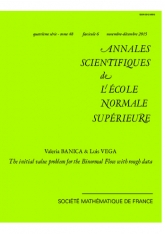Évolution par le flot binormal de courbes à un coin
The initial value problem for the Binormal Flow with rough data

- Consulter un extrait
- Année : 2015
- Fascicule : 6
- Tome : 48
- Format : Électronique
- Langue de l'ouvrage :
Anglais - Class. Math. : 35Q35, 35Q55, 35BXX.
- Pages : 1423-1455
- DOI : 10.24033/asens.2273
Dans cet article on considère le flot binormal avec données initiales des courbes régulières partout sauf en un point où elles ont un coin. On montre sous des conditions appropriées sur la donnée initiale qu'il existe une unique solution régulière pour des temps strictement positifs et négatifs. De plus, cette solution satisfait le flot binormal en un sens faible et peut être vue comme une perturbation d'une solution auto-similaire bien choisie. Réciproquement, on montre aussi que si à temps $t=1$ on prend comme donnée initiale une petite perturbation régulière d'une solution auto-similaire, alors il existe une unique solution, qui à temps $t=0$ est régulière partout sauf en un point où elle a un coin de même angle que celui formé par la solution auto-similaire. Cette solution peut être prolongée aux temps négatifs. La preuve s'appuie sur les résultats des articles précédents [Gutiérrez et al., Comm. Partial Differential Equations 28 (2003)], [Banica & Vega, Comm. Math. Phys. 286 (2009)], [Banica & Vega, J. Eur. Math. Soc. 14 (2012)] et [Banica & Vega, Arch. Ration. Mech. Anal. 210 (2013)] sur l'étude des petites perturbations des solutions auto-similaires. Un argument de compacité est utilisé pour éviter les conditions à poids imposées dans [Banica & Vega, Arch. Ration. Mech. Anal. 210 (2013)], ainsi qu'une analyse plus raffinée des asymptotiques en temps et en espace des vecteurs tangents et normaux.

